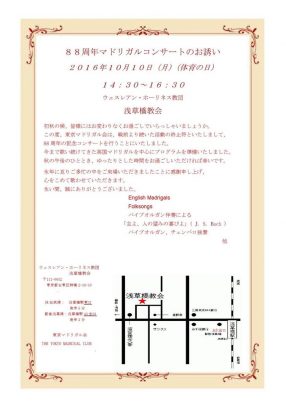
The Final Concert
News15 September 2016
The end of the Tokyo Madrigal Club
I received an invitation today for what will apparently be the final concert of the Tokyo Madrigal Club. Admission is free, and it’s on October 10 (a National Holiday in Japan) from 2.30-4.30, at Wesleyan Holiness Asakusabashi Church.
I’m not sure how many people have heard of the Tokyo Madrigal Club, but it’s the end of an era. The Club was founded in 1929 by Keiichi Kurosawa, son of a successful typewriter entrepreneur, and has continued to meet for weekly rehearsals ever since, even during World War II. Kurosawa was introduced to madrigals while studying at Trinity College, Cambridge, in the 1920s, and was enchanted both by the pieces themselves and by their guiding principle – the simple pleasures of music-making among friends. The Club’s repertoire consists mostly of English and Italian madrigals, along with Christmas carols in season, and the occasional American folk song. There is normally an annual concert in the run-up to Christmas (though these were suspended for a while during the War), and this year’s will be the 88th in the series.
While continuing to run the family typewriter business in Ginza, Kurosawa did a great deal to promote British music in Japan, editing and publishing a series of madrigal books that remain the standard Japanese editions today. I gather he made frequent appearances on NHK as the recognised expert in this particular field.
The Madrigal Club had close ties with the British Council, and for many years used to meet in its offices. As a result of this connection, it was Kurosawa who took the role of guide when Benjamin Britten and Peter Pears visited Japan under British Council auspices in 1956. The two of them attended a rehearsal of the Club that February, and made their own addition to its lore. When the singers reached the end of Wilbye’s madrigal “Sweet Honey-Sucking Bees”, Peter Pears asked “What about Part II”? Kurosawa had been unaware that this madrigal has a second part. On his return to England, Pears sent a copy over, and subsequently the Club has always sung both parts together.
When Keiichi Kurosawa died, which I think was in 1982, his son Hiroshi (who also uses the name “Peter”) continued the tradition. He, by the way, had been the driver when Britten visited Japan, and inherited the Dolmetsch recorder – with the initials B.B. engraved on it – that Britten gave to his father as a token of thanks. When I first lived in Japan in 1983, I was eager to do some singing, and was pointed in the direction of the Madrigal Club, becoming a regular attendee at their Wednesday evening meetings, which were held at the British Council’s offices. I had no idea, and actually at that time not much interest, in what the British Council did. Ironically, I was to become its Director in Japan 24 years later.
In recent years, the Club’s members have aged, and have perhaps found it hard to tempt young people to come and sing madrigals of an evening. There has also been increasing difficulty in finding rehearsal venues. The arrangement with the British Council lapsed some time before I got involved, but I can see that with the Council busy in the evenings with English classes, madrigal singing would be a disturbance, even if a room could be found.
So it is with some sadness that I salute the Tokyo Madrigal Club and its long contribution to Anglo-Japanese relations. Anyone who is in Tokyo in October might want to witness its final curtain call. Alas, I won’t be there. To quote the group’s signature song “Waly Waly” (which all members know by heart) “The water is wide; I cannot get over”.